How to care for dentures
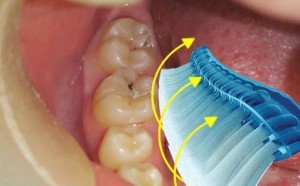
After a denture is installed, the doctor should tell the patient how to care for dentures.
The functionality, aesthetic appearance and durability depend on the proper care of the removable structure.
For the first time after installing the prosthesis, you will need to get used to it.
Immediately after the start of using the dental structure, discomfort is felt, nausea, diction disturbance and other unpleasant sensations may appear.
But, if you properly care for the prosthesis, these phenomena will pass soon enough.
- The addiction to the design is facilitated by the frequent drinking of warm tea with lemon, and the resorption of candies.
- In pharmacies, you can buy specially designed products for convenient fixation of prostheses and protection against irritation of the oral mucosa, as well as cleaning products.
When using a removable dental structure, violations most often occur:
- Self-cleaning oral cavity.
- Microcirculation of the oral mucosa.
- Thermoregulation.
- Taste perception.
- Dictations.
Unfortunately, the owners of dentures do not always know what should be the care of dentures.
Improper care can lead to frequent visits to the dentist with a gum problem.
To prevent artificial teeth from causing discomfort for them, careful care is also required for real teeth.
The resulting bacterial plaque in the gaps between the prosthesis and the gum is the main cause of gum disease and bad breath.
Dental care methods
To care for removable dentures, use:
- Fixing agents: cream, gel, fixing pads.
- Cleansing tablets and powders.
- The use of a special brush and denture cleanser.
Care products
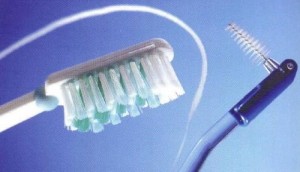
- Toothpaste.
- Special paste for interdental spaces.
- A brush to clean the spaces between the teeth.
- Floss (dental floss) for teeth.
- Toothbrush with soft bristles.
- Mouthwash.
- Tablets for indicating plaque, cleaning and disinfection of the prosthesis.
How to care
An indicator of quality care for the dental structure is the absence of plaque and food particles on the prosthesis.
- The hygiene of dentures is their thorough cleaning of food particles and bacterial plaque at least twice a day.
- After each meal, rinse your mouth and rinse the prosthesis in running water.
- Carefully brush your teeth and removable structure with a toothbrush and toothpaste. It is necessary to clean the denture in the morning and in the evening.
- Place the structure in a specially prepared solution for cleaning and disinfection. With it, you can clean the prosthesis not only from germs, but also from extraneous odors.
- Before going to bed, dental structures must be removed, cleaned and lowered into a glass with a disinfectant solution.
It is especially necessary to clean the inner surface of the prosthesis in contact with the gum. If transportation is necessary, the denture can be placed in a special container.
Video: “How to use an ultrasonic cleaner”
Cleansing Methods
To clean the dental structures used mechanical, chemical methods and their combination.
Mechanical method
Mechanical cleaning is carried out using a special brush.
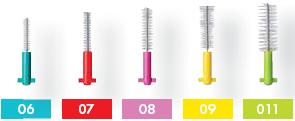
- The cleaning brush is most often double-sided.
- The zigzag-shaped working part is designed to clean the outer surface of the dental structure, and the other (rounded) - the surface adjacent to the mucous membrane of the oral cavity.
- The bristles of such brushes are stiffer than those of a brush designed for brushing teeth.
- One-sided brushes and brushes also have increased rigidity, with which you can also clean the structure.
- To clean hard-to-reach places you can use a brush - brush and dental floss.
However, cleaning with a toothbrush is not enough.
Ultrasonic cleaning is more effective.
- The design is placed in a special container with water or an antiseptic.
- Since the use of such a device is not always possible at home, due to its high cost, most often this method of cleaning is used in dental clinics.
Apparatuses that generate microwave radiation are similarly used.
This cleaning method contributes to the death of microorganisms, but does not destroy the spores and waste products of bacteria: toxins, enzymes, etc.).
Chemical cleaning
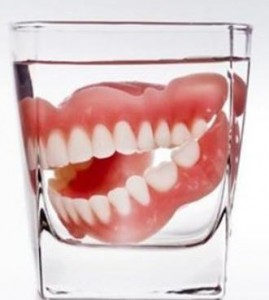
This method involves soaking a removable denture in a special solution.
The result is an antibacterial effect.
The structure is soaked for 10 to 20 minutes.
Biologically active substances clean the structure in hard to reach places and do not damage it mechanically.
Currently, manufacturers offer tablets that not only cleanse, but also bleach the prosthesis.
Prosthesis fixation
An important component of caring for removable structures is their proper fixation in the oral cavity.
- There is a sufficient amount of fixative to fix the prosthesis on the gums.
- These funds prevent gum chafing, increase the efficiency of chewing, and prevent food particles from getting under the prosthesis.
- Fixing agents accelerate the addiction to the structure and facilitate its use.
Basic Denture Care
In the first days after the installation of the denture, it should be remembered that the use of the design requires getting used to.
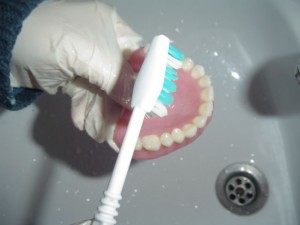
- The first few days, the food should be chopped and soft enough. It is better to eat in small portions in order to be able to chew food well. It is necessary to pass to habitual food gradually.
- When chewing food, evenly distribute between all teeth on both sides. It is not recommended to bite off solid food with your front teeth.
- Hygienic care for the dental structure must be thorough, the same as for your own teeth.
- After each meal, rinse the mouth and prosthesis.
- It is necessary to remove from the mouth and put on the dental structure above a sink filled with water or by putting a soft cloth in it.
- It is necessary to clean the prosthesis at least twice a day using a brush with paste, then placing it in a disinfection solution.
- You can store the structure thoroughly cleaned in a special container.
- At night, the prosthesis can be placed in a glass of water.
- Once every six months it is necessary to visit the dentist for structural correction.
- Using denture fixation aids.
- In case of prosthesis failure, consult a doctor.
What can not be done
- You can’t eat sticky, viscous foods, because this can lead to a violation of the fixation of the structure in the oral cavity.
- It is forbidden to gnaw solid food, as such food can cause spalling of the artificial tooth or damage to the prosthesis.
- Use a broken tooth structure. Using a broken prosthesis can cause injury to the oral mucosa.
- No need to try to repair the structure. Household glue is toxic to the body.
- You can not use a hard brush to clean the denture, because this can ruin the surface of the structure.
- Do not clean the prosthesis over an empty sink. It can suddenly slip out and break.
Reviews
- At 45, I had to part with all the teeth on my upper jaw. When I turned to the dentist, the only solution to this problem for me was prosthetics with a removable denture. At first I was confused, because I imagined that it should be removed for the night and stored in a glass of water. The doctor convinced me, she said that modern dentures can only be removed to clean. The main thing is to use modern cleansers. In the evening, I cleaned the prosthesis with the help of the tablets I bought at the pharmacy. In fact, no difficulties.
- My wife and I went to barbecue. I ate kebab for the first time with artificial teeth, previously chopped it into small pieces. When I returned home, I felt unbearable pain in the gums. When I removed the prosthesis in the evening, I found a red spot on the gum. I bought fixing pads in the pharmacy, which the doctor recommended that I use when rubbing on the gums. As indicated in the instructions, I put it in the prosthesis and put it on. The structure more densely sat on the gum, and the rubbed place is protected.
- I have been using a removable denture for the third year and almost forgot that I have a foreign body in my mouth. I look after the design for about fifteen minutes a day. I brush my teeth and prosthesis and dip it in a disinfectant solution. While washing, he is in solution.